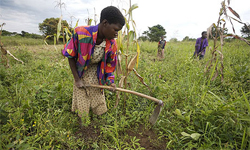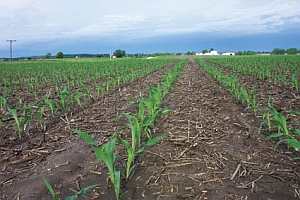Technology: Key to Environmental Sustainability and Agricultural Productivity

 |
| A farmer hand weeding Photo courtesy |
I’m talking about the kind of development that will liberate African women from backbreaking labor and allow African parents to send their children to school rather than sending them to the fields.
There is an extraordinary and fully realizable potential for vastly improving agriculture productivity in Kenya and across
According to the Alliance for the Green Revolution in Africa (AGRA), the root cause of deepening poverty in
Allow me to give a very basic example of what I’m talking about. I don’t know how many people in the industrialized nations spend much time thinking about weeds. We at Syngenta do. The people of Africa do too. But for them, weeds aren’t an inconvenience. They’re more like the fifth horseman of the apocalypse and represent a constant struggle for the survival of their crops and the sustainability of their very livelihoods. A few facts really bring this home:
*Weeds are anything but benign. They compete with crops for space, nutrients, sunlight and water. If not removed, they will literally choke out a farmer’s field.
*Hand weeding is the main weed control practice in Sub-Saharan Africa. Weeding the typical one-hectare smallholder farm requires an average of 200 hours of backbreaking labor. That’s between 50 to 70 percent of the total labor that goes into producing a crop.
*The majority of weeding is performed by women. To weed a single hectare, a woman walks 10 kilometers in a stooped position, and it can permanently deform her spine. 69% of farmers’ children are forced to leave school to help with weeding. So it’s not hyperbole to say that weeds are literally choking Africa’s future.
*Yield losses due to weeds in Africa range from 25% to total crop failure. Some weeds absorb fertilizer faster than the crop itself, so using fertilizer without herbicide can actually exacerbate the problem.
*And there is a particularly virulent, parasitic weed called Striga which attaches to the root of the host crop and cannot be destroyed by hand-weeding.
 |
| A farm weeded using herbicides Photo courtesy |
The proper application of chemical herbicides can replace hand-weeding. It can increase productivity thus creating a whole new world of hope and possibility for African farmers. With so little technology being used, Africa is the single largest organic farming area in the world. It is also the least productive. I have no problem with organic farming, in fact we have a product line developed specifically for organic farmers. However, I also believe farming practices must be safe, efficient and economic.
Today in Africa, organic farming practices surely cannot be characterized as either efficient, economic or healthier, as a number of studies have recently concluded. In my travels, I have seen some models that indeed do work. They are based on extending the same principles that we employ across the world. By closely knowing a farmer’s needs – every plot of land will be different - and by adapting knowledge and agricultural technology specifically to those needs, we can help to boost their success.
The projects I visited underscore the importance of this approach. Many of them highlighted the vital role that management of water resources plays in agricultural development. One is the Laikipia Project, near Mount Kenya. This project reaches some 2,000 smallholder farmers and focuses on training in Conservation Agriculture. This is a water and nutrient conservation strategy that has successfully increased yields in this semi-arid region. I saw the new drip irrigation system they’ve designed, and learned about the rainwater harvesting techniques they’re using for both irrigation and drinking water. I visited the local schools where our Foundation has instituted a comprehensive training program and where they installed demonstration drip kits to grow vegetables. I also saw crop protection and weed control methods that have raised yields some 50%.
The plans are to reach 30,000 farmers in the next three to five years, helping turn them from subsistence farmers into commercial enterprises. One of our farmer customers recently saw her potato crop grow from 2 to 6 bags per year, raising her income from $61 to $186, and enabling her to open a bank account and buy more land. In Laikipia, one hundred and twenty-five dollars is the difference between living on the edge of starvation, vulnerable to disease, chronic fear and suffering.
Other aspects of agriculture development might not readily come to mind here but are used extensively in other parts of the world. One is crop insurance, an especially critical need in regions prone to extreme weather conditions. That’s why our company and the Foundation have been working in partnership with the UAP Insurance Company, SwissContact and the Kenya Meteorological Department to develop a pilot project in Nanyuki to insure against drought.
It started last April with 200 farmers raising a fast-growing, drought resistant maize hybrid called Duma 43. It is the first program of its kind where the payouts are triggered by a severe drought rather than a farmer having to prove crop or economic loss. It is combined with a program of financial education and training in improved agricultural practices. And it is a community effort. Farmers learn about the insurance through meetings organized by NGO’s, the Ministry of Agriculture and cooperatives. A farmer can buy the maize seed and register for insurance at their local retailer. A local weather station records the rainfall and sends the data to the insurance company. With the rainfall data, the insurer calculates a payout according to an agronomic model. This is an innovative idea that is helping farmers even-out the variability of weather.
As central as the small-holder is to Africa’s development, there is also great potential for larger-scale farming. I saw a new, hardier variety of malt barley on a farm I visited yesterday. We developed this plant with broader leaves to make better use of the sun. We also developed it as variety that would grow closer to the ground which means it can withstand heavy rainfall. It’s estimated this plant will help improve productivity at least 30% giving
This is just one of many examples of how we are working to improve water efficiency in agriculture. On the one hand we are developing plants and chemicals that make plants more robust and help them to endure moderate drought without losing yield. On the other hand, we are working with partners to help improve how water is delivered to plants be it drip irrigation, chemigation or physical moisture preservation – like mulch. There is a lot of potential to further optimize performance since the most efficient irrigation systems still need to be adapted to various inputs and local conditions. So, whether we’re talking about large-scale farming or a small holder struggling to escape the subsistence trap – increases in productivity are key to agriculture development.
Syngenta is fully committed to doing its part but I also believe there are several policy implications that are equally essential. I will mention just three of these:
1) Trade. It’s critical. If we’re serious about development, the industrialized nations must open up their markets and allow the developing nations to create a vibrant export economy. Therefore, we must push forward with the Doha Round.
2) Science-based regulations. There is no question that our products must meet the highest of safety standards. This assessment must be based on regulatory science and frameworks. Otherwise the very tools responsible for the productivity gains agriculture has already achieved will be lost. And worse, new tools will never come to fruition.
3) My third point involves the term others have coined the “land grab” where some nations are looking to invest in others where there are large and under-developed agricultural resources. This naturally arouses concern. It is my view though that done in the right way, with the proper safeguards, this can bring important new opportunities for Africa. I believe these investments must be governed by an internationally-accepted code-of-conduct.This would ideally require all partners to demonstrate and sustain transparency, respect existing land rights, and support and improve existing farming systems, so that farmers are given the means to increase their own productivity and food security.
Unfortunately though, many firms in the plant science industry have little or no presence here, such that Africa represents less three percent of the industry’s global market value. Syngenta is committed to helping to bring about a change to this. We are committed to bringing technology and knowledge to African farmers. We are committed to the broad-based commercial development of
It’s my pleasure to announce Syngenta’s new partnership with the Syngenta Foundation and the International Maize and Wheat Improvement Center (CIMMYT). This partnership is designed to quick start a solution to the wheat rust, known as UG99. This stem rust first emerged in Uganda in 1999 and is currently spreading across Africa, Asia and the
There’s a famous saying by business management guru Peter Drucker that successful entrepreneurs “don’t solve problems, they pursue opportunities.” And we should think about Africa in this way. Given the increases in world population and rising living standards, it’s generally accepted that the human race is going to have to double food production by 2050, it is also generally accepted that land resources are limited. But
Those are, admittedly, big “ifs.” But in my short time that I have spent with Kenyan farmers seeing the dramatic effects of modern agriculture in their lives, it gives me great confidence in the future. We know how to do this. I believe it can only be done collectively with scientists, business people, government leaders and policy experts. People committed to progress. People committed to opportunity. Working together we can and will make a profound difference.
By Mike Mack,
CEO, Syngenta
Excerpted from his presentation during the opening session of the Pan Africa Chemistry Network (PACN) Sustainable Water Conference, Nairobi Kenya.
